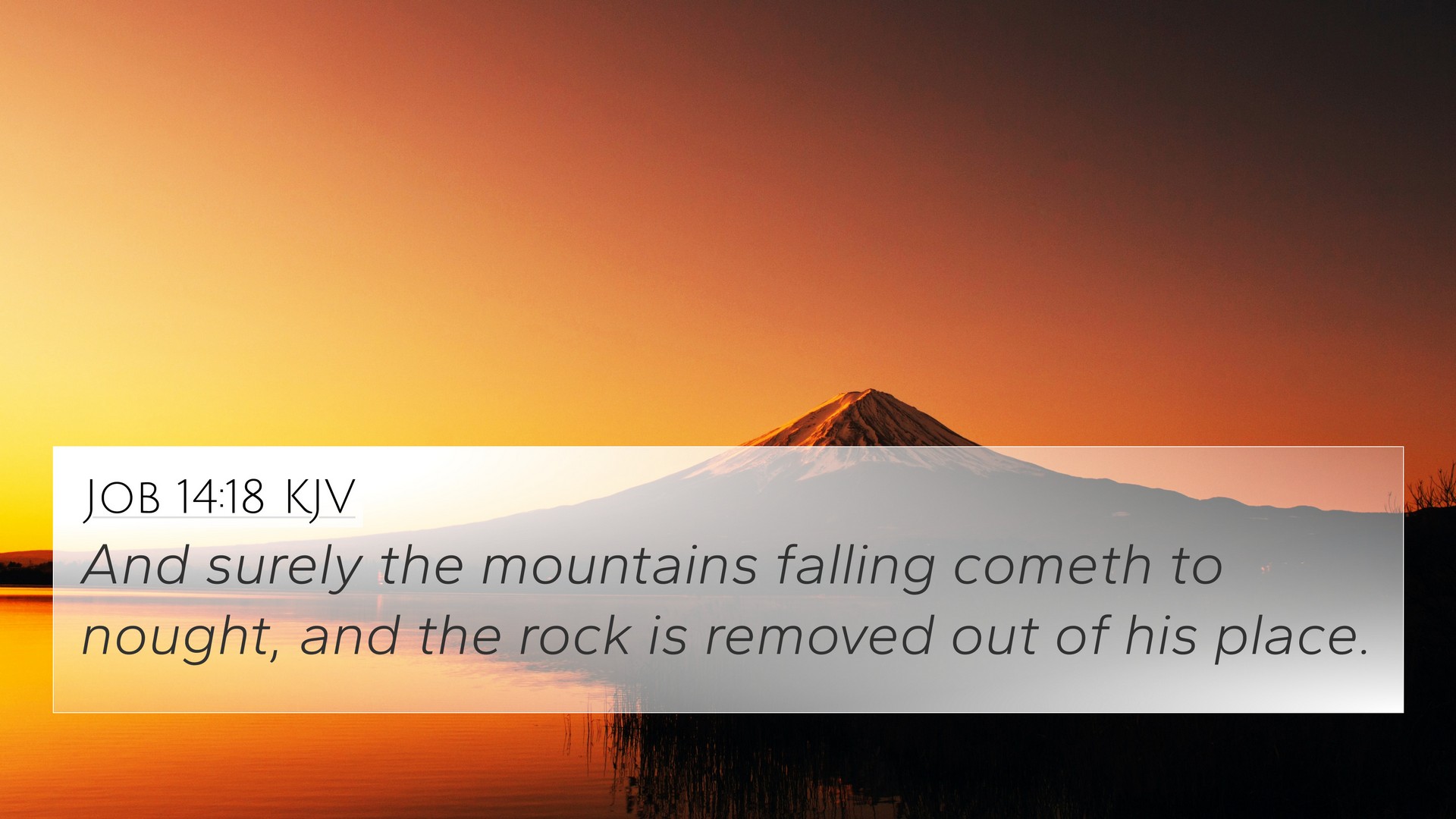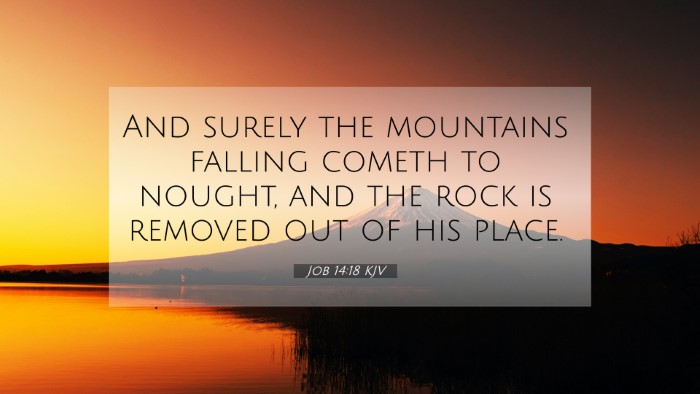Old Testament
Genesis Exodus Leviticus Numbers Deuteronomy Joshua Judges Ruth 1 Samuel 2 Samuel 1 Kings 2 Kings 1 Chronicles 2 Chronicles Ezra Nehemiah Esther Job Psalms Proverbs Ecclesiastes Song of Solomon Isaiah Jeremiah Lamentations Ezekiel Daniel Hosea Joel Amos Obadiah Jonah Micah Nahum Habakkuk Zephaniah Haggai Zechariah MalachiJob 14:18 Similar Verses
Job 14:18 Cross References
And surely the mountains falling cometh to nought, and the rock is removed out of his place.
Uncover the Rich Themes and Topics of This Bible Verse
Listed below are the Bible themes associated with Job 14:18. We invite you to explore each theme to gain deeper insights into the Scriptures.
Job 14:18 Cross Reference Verses
This section features a detailed cross-reference designed to enrich your understanding of the Scriptures. Below, you will find carefully selected verses that echo the themes and teachings related to Job 14:18 KJV. Click on any image to explore detailed analyses of related Bible verses and uncover deeper theological insights.
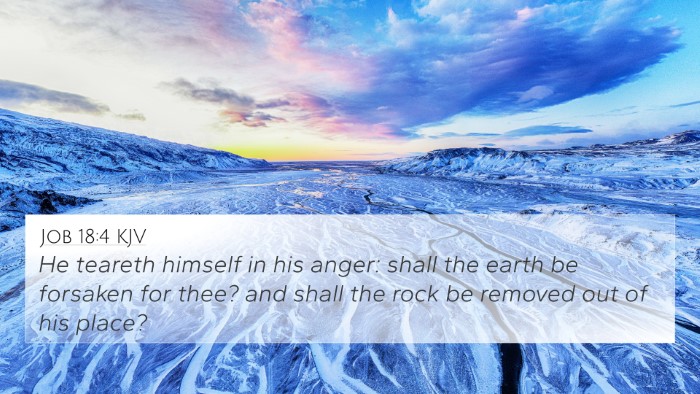
Job 18:4 (KJV) »
He teareth himself in his anger: shall the earth be forsaken for thee? and shall the rock be removed out of his place?
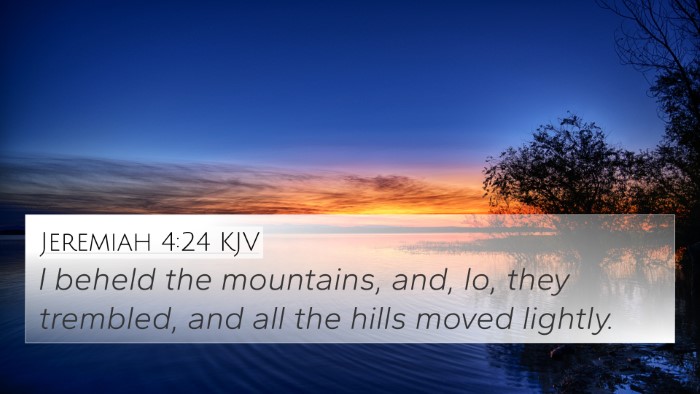
Jeremiah 4:24 (KJV) »
I beheld the mountains, and, lo, they trembled, and all the hills moved lightly.
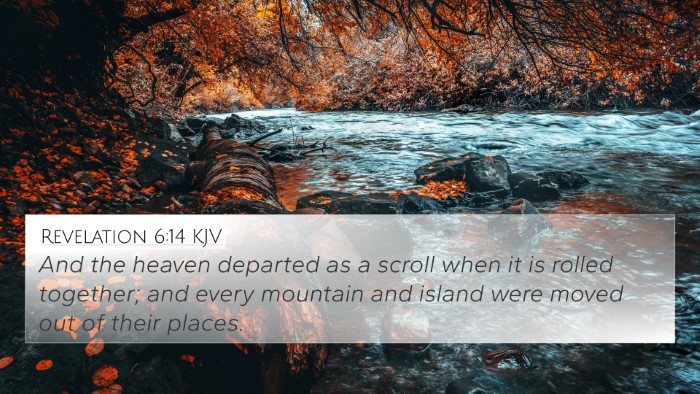
Revelation 6:14 (KJV) »
And the heaven departed as a scroll when it is rolled together; and every mountain and island were moved out of their places.
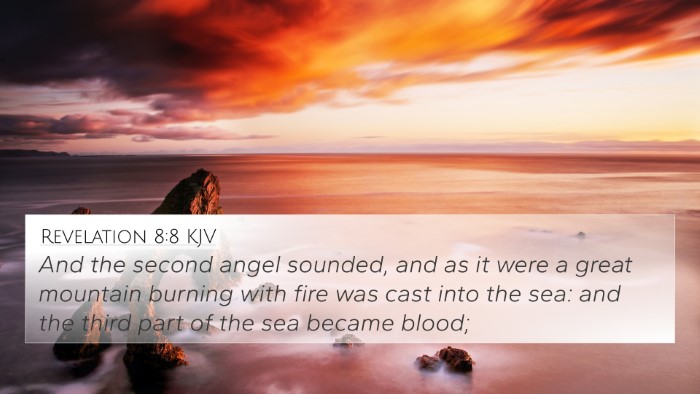
Revelation 8:8 (KJV) »
And the second angel sounded, and as it were a great mountain burning with fire was cast into the sea: and the third part of the sea became blood;
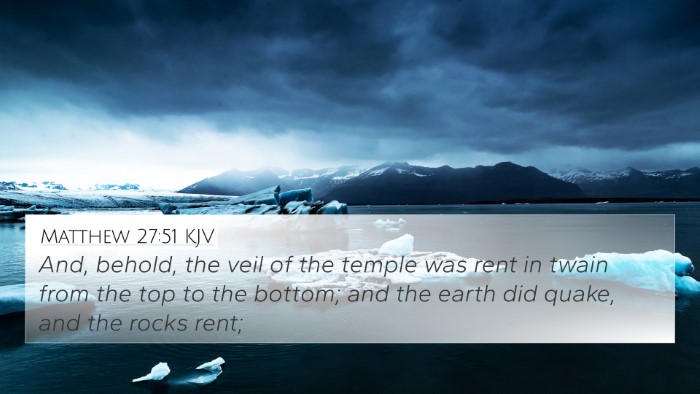
Matthew 27:51 (KJV) »
And, behold, the veil of the temple was rent in twain from the top to the bottom; and the earth did quake, and the rocks rent;
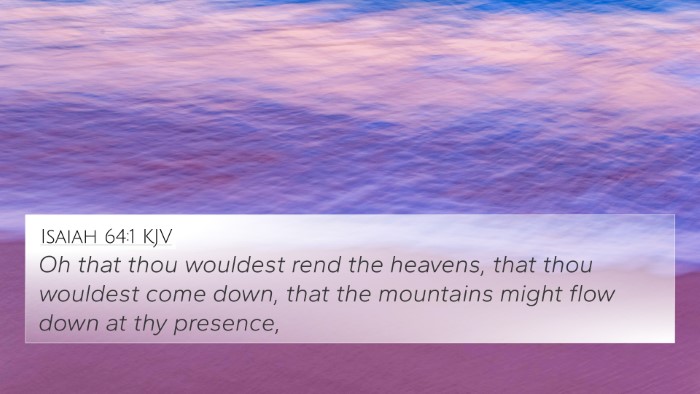
Isaiah 64:1 (KJV) »
Oh that thou wouldest rend the heavens, that thou wouldest come down, that the mountains might flow down at thy presence,
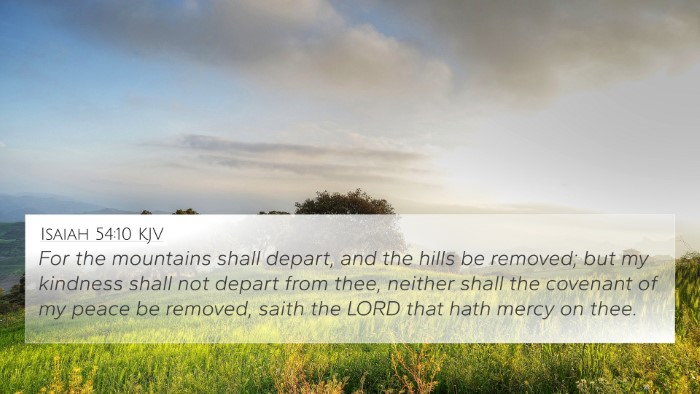
Isaiah 54:10 (KJV) »
For the mountains shall depart, and the hills be removed; but my kindness shall not depart from thee, neither shall the covenant of my peace be removed, saith the LORD that hath mercy on thee.
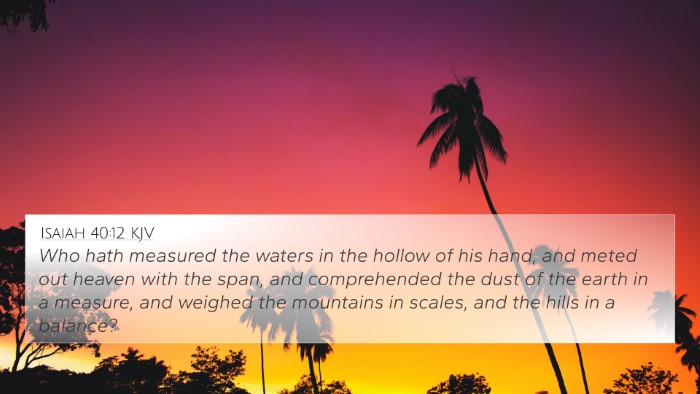
Isaiah 40:12 (KJV) »
Who hath measured the waters in the hollow of his hand, and meted out heaven with the span, and comprehended the dust of the earth in a measure, and weighed the mountains in scales, and the hills in a balance?
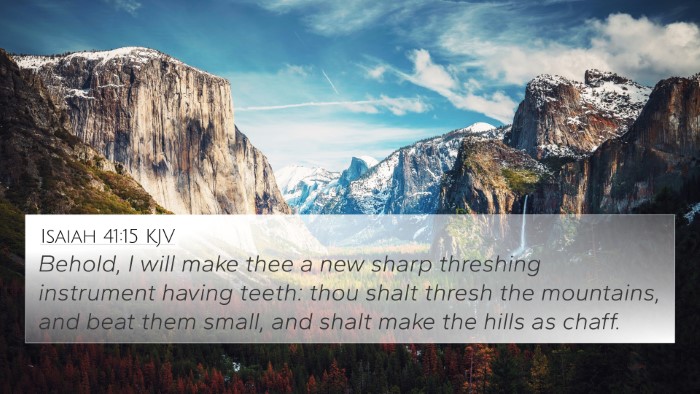
Isaiah 41:15 (KJV) »
Behold, I will make thee a new sharp threshing instrument having teeth: thou shalt thresh the mountains, and beat them small, and shalt make the hills as chaff.
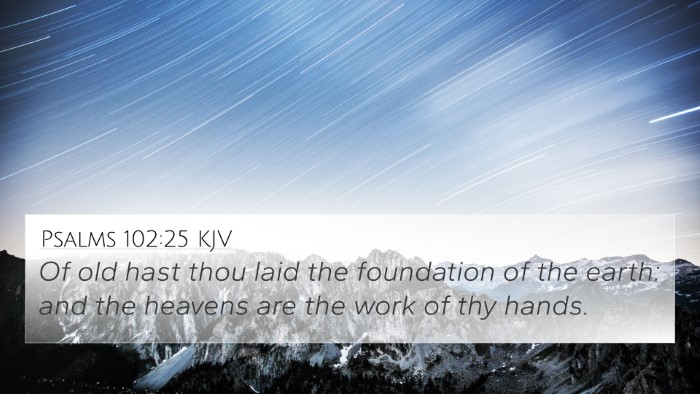
Psalms 102:25 (KJV) »
Of old hast thou laid the foundation of the earth: and the heavens are the work of thy hands.
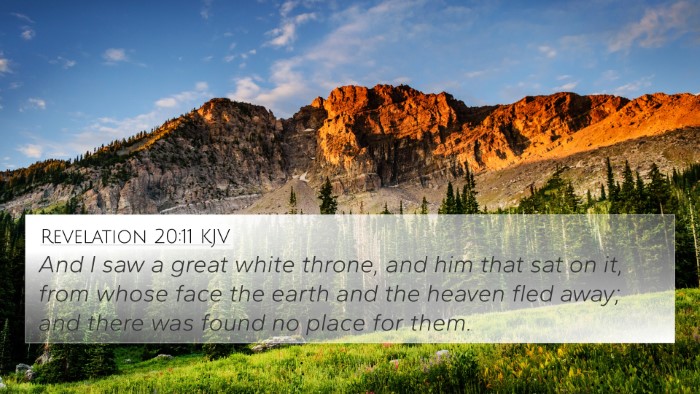
Revelation 20:11 (KJV) »
And I saw a great white throne, and him that sat on it, from whose face the earth and the heaven fled away; and there was found no place for them.
Job 14:18 Verse Analysis and Similar Verses
Understanding Job 14:18
Job 14:18 reads: "But as a mountain falls and crumbles away, and as a rock is moved from its place." This verse is part of Job’s discourse expressing his thoughts on human frailty and the inevitable nature of death.
Summary of Insights
In this verse, Job draws an analogy between the permanence of nature and the fleeting existence of man. Public domain commentaries, including those by Matthew Henry, Albert Barnes, and Adam Clarke, provide valuable insights into the profound meaning behind this verse.
- Matthew Henry: Henry emphasizes the certainty of death, comparing it to geological processes that are inevitable. He highlights that just as mountains crumble away, so too does the mortal body return to dust, reinforcing the transient nature of our earthly life.
- Albert Barnes: Barnes notes that the imagery of a mountain falling speaks to the suddenness and unexpectedness of death. He articulates how such transformations in nature serve as reminders of the temporary state of human existence.
- Adam Clarke: Clarke focuses on the philosophical aspects of the passage, contrasting the stability of the earth compared to the instability of human life. He discusses how this verse reflects Job's deep existential insights into mortality and divine justice.
Key Themes
The major themes derived from this verse include:
- Mortal Fragility: The inherent weakness of human life.
- Divine Sovereignty: God’s control over life and death.
- Hope and Despair: The balance of faith amidst suffering.
Bible Verse Cross-References
Job 14:18 can be meaningfully connected with several other scriptures, enhancing understanding through comparative Bible verse analysis. Below are cross-references that relate to this verse:
- Psalm 90:3 - "You turn man to destruction, and say, 'Return, O children of men!'"
- Ecclesiastes 3:20 - "All go to one place; all are from the dust, and to dust all return."
- Job 10:9 - "Remember that You have made me like clay; and will You turn me into dust again?”
- Isaiah 40:7 - "The grass withers, the flower fades; when the breath of the Lord blows upon it; surely the people are grass."
- James 4:14 - "Whereas you do not know what will happen tomorrow. For what is your life? It is even a vapor that appears for a little time and then vanishes away."
- 2 Corinthians 5:1 - "For we know that if our earthly house, this tent, is destroyed, we have a building from God, a house not made with hands, eternal in the heavens."
- Job 7:21 - "Why then do You not pardon my transgression, and take away my iniquity?"
Connections between Bible Verses
Through inter-Biblical dialogue, the verse encourages reflections on mortality and divine purpose. For example:
- Comparative studies of Pauline epistles illustrate links between suffering and salvation.
- Cross-referencing Psalms with New Testament teachings provides deeper insight into eternal life and resurrection themes.
- Identifying connections between the Old and New Testament reveals a thematic consistency regarding human existence and God's plans.
Tools for Bible Cross-Referencing
To deepen understanding of Job 14:18 and related verses, you may utilize:
- Bible Concordance: A useful resource for finding words and topics across scriptures.
- Bible Cross-reference Guide: Helps locate related verses that reflect similar themes or concepts.
- Bible Reference Resources: Tools that streamline locating and understanding Biblical texts.
Conclusion
Job 14:18 eloquently portrays the transient nature of human life through powerful imagery. By exploring this verse alongside relevant cross-references, one can engage in a meaningful study that highlights both the frailty of humanity and the hope found in God. Understanding these connections enriches one's Biblical study and spiritual journey.
